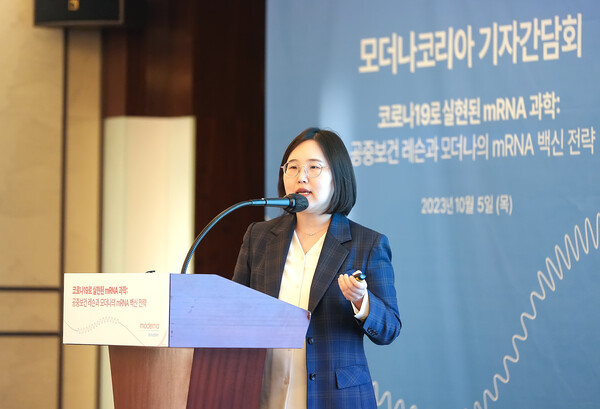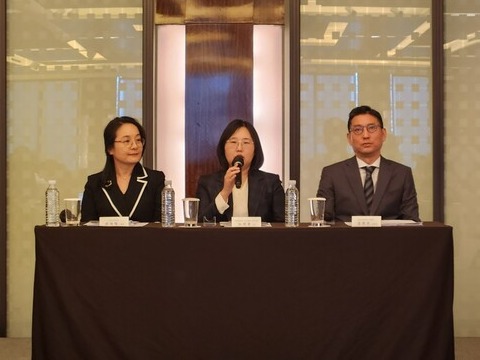Despite Korea reducing Covid-19 emergency response levels, immunology experts elaborated that the only way to keep the virus under control was through seasonal updated vaccination to adapt to the mutating virus.

In response, Moderna Korea held a press conference on Thursday to share data on the clinical value of its updated Covid-19 vaccine while emphasizing that Spikevax X was effective against the circulating variants and breakthrough infections.
Currently, Spikevax X provides robust neutralizing antibody responses against variants such as XBB.1.5, XBB.1.16, XBB.2.3.2, EG.5, and FL.1.5.1, offering protection against the presently circulating virus variants. In a statement on Wednesday, Moderna also announced the first domestic supply of the updated vaccine which was manufactured by Samsung Biologics.
Subsequently, the KDCA's 2023-2024 Covid-19 vaccination campaign is scheduled to start on Oct. 19 and will run until March 31, 2024. The government highly recommends the elderly aged 65 and over, immunocompromised individuals between the age of 12-64 and indidviduals assocciated with facilities which have high infectious risk. Other individuals who fall outside this category can be vaccinated starting from November 1 to March 31 via reservations on the KDCA website.
Similar to influenza vaccination, only one dose is required during the vaccination period. Individuals who have not completed the first and second doses will not require a booster dose when they receive the new vaccine.
Professor Noh Ji-yun of Korea of Infectious Disease at Korea University Guro Hospital spoke about her Covid-19 patient treatment experience, emphasizing that Covid-19 still poses a high disease burden for high-risk groups.

"According to the Korea Centers for Disease Control and Prevention Agency (KDCA), completion of bivalent vaccination reduces the risk of severe outcomes, including death, by 95.1 percent compared to unvaccinated individuals, even if the disease is confirmed after vaccination," said Professor Noh. "In clinical practice, there are cases where the elderly, people with underlying diseases, and immunocompromised individuals have severely deteriorated health conditions due to Covid-19.”
She further added that immunocompromised individuals should consider using less immunosuppressants to allow the vaccine to work more effectively, Particularly, she pointed out the need for high-risk groups to get the vaccine to reduce the risk of hospitalization.
Moderna Korea Country Medical Director Kim Hee-soo also echoed similar comments.
“There are still a large number of severely ill patients, including the elderly over 65 years old, people with underlying medical conditions, and the immunocompromised, who are hospitalized and require medical attention for Covid-19,” said Kim.
Kim also shared that Moderna is making preparations for other emerging infectious diseases, expecting to launch the respiratory syncytial (RSV), seasonal flu, a combined flu and Covid-19 vaccine alongside a next-generation Covid-19 vaccine into clinics by 2025. Among the 43 drugs in the pipeline, the RSV vaccine is the most advanced and will target disease prevention in individuals over 65 years of age.
"We will continue to focus on developing mRNA medicines to combat unpredictable emerging infectious diseases, including our 43 active research programs," said Moderna Korea General Manager Sohn Ji-young.

